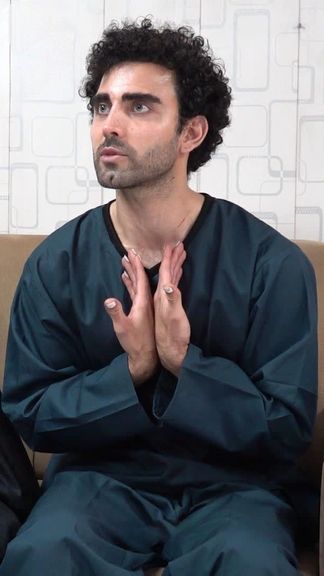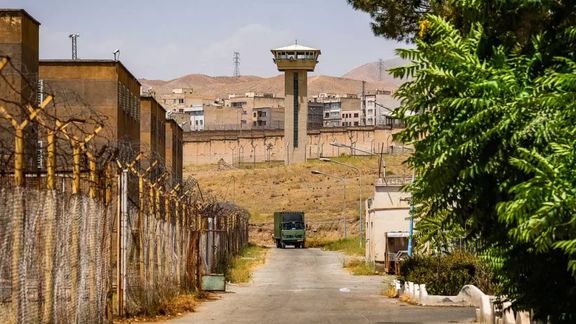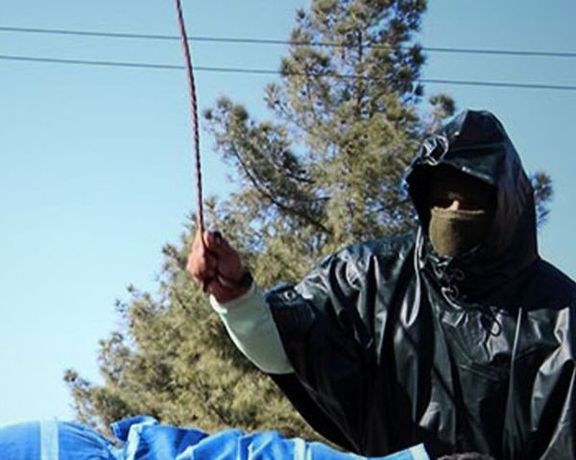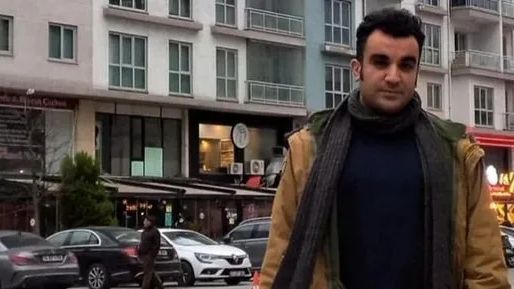Iranian Actor Charged With Inciting Violence

Iranian actor Mohammad Sadeghi,who was arrested for criticizing morality police has been charged with "inciting people to commit acts of violence."

Iranian actor Mohammad Sadeghi,who was arrested for criticizing morality police has been charged with "inciting people to commit acts of violence."
A source close to his family told the US-based Human Rights Activists News Agency (HRANA) that he was also charged with "encouraging people to engage in corruption and prostitution."
In mid-July, police raided Sadeghi’s apartment as he was live blogging about the return of hijab patrols – or the so-called 'morality’ police -- to the streets on Instagram, after a video had gone viral of a woman violently detained.
“Believe me, if I saw such a scene, I might commit murder,” he wrote in the caption of his video. "Why do you get paid? To take people's daughters into a van and arrest them?"
The agents broke into his house to arrest him, but he jumped from the third floor in a bid to escape. A dramatic chase ensued, which he filmed and streamed live on Instagram, in spite of the regime's attempts to ban the app.
In a new campaign to enforce mandatory hijab, morality police have now returned to the streets in full force after a brief few months' respite following the worst of the unrest which erupted in September after the death of Mahsa Amini in morality police custody.
Women continue to defy the official dress code, particularly in Tehran, despite the crackdown, with huge numbers seen across the country's public spaces from malls to universities with their hair uncovered as they flout the mandatory hijab rules.
Experts fear the renewed zeal of the morality police risks reigniting tensions.

Iran's judiciary has confirmed that it is relocating inmates from the Rajaei Shahr Prison in Karaj, as many believe its large land will be sold to developers soon.
“Prisoners of this prison, which is located in one of the best areas of Karaj, are being relocated to another prison,” the judiciary’s media center said in a statement on Thursday.
Rajaei Shahr (formerly Gohardasht) Prison, considered as one of the harshest prison environments in the country, is in Karaj, a city less than 30 kilometers west of the capital Tehran. Originally built before the Islamic Revolution of 1979 in the outskirts of Karaj, the prison is now in the middle of one of the city’s most expensive areas.
One reason why the prison lives in infamy is the massacre of hundreds of political prisoners there in 1988. Iran's first supreme leader, Ruhollah Khomeini, ordered the killing of prisoners who were members of MEK (The People's Mojahedin Organization of Iran), an armed opposition group, and also Marxists serving their sentences.
Since 2009, when thousands were arrested after a disputed election, many well-known political prisoners and activists were held at Rajaei Shahr alongside other prisoners most of whom were serving sentences for drug-related offenses.
On several occasions in the past two years, protesters have staged sit-ins outside Rajaei Shahr to prevent the execution of political and other prisoners.
“The plan to relocate prisoners ensues from the government’s fear of repetition of such [civil] resistance [to execution],” Seda-ye Shahrivar Twitter account which is dedicated to news of protests and dissent wrote, adding that security forces are planning to relocate prisoners of at least twenty major jail in provincial capitals across the country to remote prisons.
“In fact, the closure of Rajaei Shahr is meant to facilitate suppression, harassment and execution of prisoners, making people’s access to their imprisoned loved ones difficult, and increasing the distance between prisons from places where life is happening,” Seda-ye Sharivar wrote.
The judiciary’s statement did not mention videos posted on social media that show prisoners already being taken from Rajaei Shahr to the notorious Ghezel Hesar Prison. Social media reports indicate that some of last year’s protesters including Mohammad Beroghani who has been sentenced to death are among those transferred to Ghezel Hesar.
According to Seda-ye Sharivar, relocation of prisoners started on the evening of July 31 without prior announcement and since then at least 300 inmates, including many political prisoners, have been sent to Ghezel Hesar.
Ghezel Hesar, Iran's largest prison which houses around 20,000, is located in the Alborz Province, 20 km (12 miles) to the northwest of the capital Tehran, and is also near Karaj. Ghezel Hesar has mainly housed around 20,000 ordinary prisoners, four times more than it had been built for.
“This prison is among the evidence of the crime [mass execution of political prisoners in 1988] and its layout was repeatedly mentioned in the trial of Hamid Nouri [in Sweden],” senior journalist of Radio Zamaneh, Farzad Seifikaran, wrote about Rajaei Shahr, adding that any building development could obliterate some of the most important proof of the atrocities committed against political prisoners who were executed in thousands over a few months.
The government of President Ebrahim Raisi on June 22, 2022, allowed the judiciary to sell both Rajaei Shahr, an estate of nearly 600,000 sqm (150 acres), and pay the proceeds to the government.

Narges Mohammadi, a prominent imprisoned Iranian human rights activist has been handed down an additional one year jail sentence in a new verdict.
This latest decision by the judiciary of the Islamic Republic has increased her total sentence to 10 years and 9 months in prison, coupled with 154 lashes.
The verdict stems from Mohammadi's alleged offense of "propaganda against the system by giving a statement from inside the prison," as stated on her Instagram page. In the said statement, she voiced her protest against the "harassment and sexual abuse of women" in detention centers, and addressed a letter to Javaid Rehman, the Special Rapporteur on the Situation of Human Rights in the Islamic Republic of Iran.
This particular case is one of the five ongoing investigations against Narges Mohammadi, conducted by the Evin Security Prosecutor's Office.
Refusing to participate in the hearing of the new accusations, Mohammadi, the Deputy Director of the Defenders of Human Rights Centre (DHRC), boldly declared that she "does not recognize the Islamic Republic and its sham and deceptive courts," as conveyed in her Instagram post.
The preliminary verdict was communicated to Mohammadi while she remains detained in the women's ward of Evin prison. However, she did not sign the receipt of the verdict.
In recent months, despite her confinement, Mohammadi has been an outspoken advocate for the uprising of Iranians against the Islamic Republic. From inside the prison, she has openly condemned repression against protesting students, citizens, and the Baha'i community, among others.
Narges Mohammadi's imprisonment dates back to November 2021, and she continues to serve her sentence.

Iran's judiciary has dramatically increased lashing sentences against civil and political activists following the Mahsa uprising, according to Iran's Prison's Atlas.
The issuance of such sentences, part of the Islamic penal code, has quadrupled compared to the previous year, with at least 117 activists, including 13 women and 104 men, being sentenced to a total of 7,404 lashes, alongside 99 years and three months in prison and a fine of 1.16 billion rials (approximately $2300).
The charges leading to these sentences primarily involve "disturbing public order and publishing falsehoods with the intention of disturbing the public opinion," as per the Islamic Penal Code.
Comparing the current statistics to the period from September 2021 to October 2022, the judicial system had sentenced 29 political and civil activists, comprising 18 women and 11 men, to a total of 1,970 lashes, 32 years and 10 months in prison, and 510 million rials in fines.
The Atlas of Iranian Prisons strongly criticized the authorities for employing whipping, despite being aware of its physical and psychological harm, to suppress citizens and political opponents and maintain ideological control.
The increase in flogging sentences coincides with ongoing concerns about the treatment of protesters following the revolutionary uprising of Women, Life, Freedom. Many arrested protesters currently face the risk of execution, and the judicial system has already carried out death sentences against seven of them.
Disturbingly, numerous reports have emerged detailing incidents of rape, assault, and sexual harassment against some arrested protesters during the uprising. Moreover, several other detainees have suspiciously died shortly after their release from prison.

Two Iranian well-known sports journalists who were in Australia to cover FIFA Women's World Cup have said they will not return to Iran.
Saeed Zahedian, the chief sports editor of the Iranian government's Iran Newspaper, and Naeem Ahmadi, the newspaper's photojournalist, plan to apply for asylum in Australia, they told Iran International.
Iran Sports daily is among the most popular newspapers in Iran and Naeem Ahmadi is one of the best sport photographers of Iran.
Last week, two Iranian female journalists, who were arrested during anti-regime protests, were sentenced to three years and seven months in prison. In addition, the journalists opposed compulsory hijab during court proceedings, which led to further controversy, as reported by the US-based Human Rights Activists News Agency (HRANA).
The regime has intensified pressure against journalists. Earlier this month, Behrooz Behzadi, who is in his late 70s as is the editor in charge of Etemad newspaper, ‘accused of publishing false content’ following a complaint by Revolutionary Guard Corps and banned from any kind of press activity for one year.
The increasing repression against journalists has drawn condemnation from various quarters, including the Tehran Journalists’ Association, which denounced the issuance of "heavy and unconventional judicial sentences against journalists" and urged the judicial system to halt such practices.
The Islamic Republic's track record as a major repressor of the media has drawn international attention. However, the current wave of repressions has escalated since the nationwide uprising against the regime.

The Turkish government is facing criticism for its treatment of Iranian dissidents seeking political asylum in this country.
The recent arrest of Mohammad Lahmi, a former airline pilot and a cleric who fled from Iran in 2022, has highlighted the growing apprehension among activists.
His prosecution and arrest is said to have stemmed from a business dispute involving influential businessmen closely linked to the Revolutionary Guards.
Lahmi had sought refuge in Turkey to escape persecution by the Iranian regime, but even while residing in Turkey, he continued to criticize the Iranian government through his social media platform.
Activists argue that since the Iranian regime provided political support to President Recep Tayyip Erdogan's government following a failed coup in 2016, Turkey's willingness to shelter Iranian dissidents has diminished. This has led to an increase in deportations back to Iran, where dissidents fear for their safety and well-being.
In December 2019, two Iranian protesters, Mohammad Rajabi, 25, and Saeed Tamjidi, 27, faced a high-profile case when they were arrested and deported to Iran. Turkish police handed them over to Iranian authorities, leading to their transfer to Evin prison.
Despite their death sentences being rejected in appeal courts, they were imprisoned for several years, along with another protester, following several months of detention.
Adding to the growing concern, reports have emerged of another Iranian political activist, Shahriar Baratinia, being deported from Turkey to Iran on Thursday.
Baratinia, a former political prisoner who had been residing in Turkey without a residence permit, faces potential danger upon his return to Iran, according to human rights website Hirman.
Human rights groups are closely monitoring the situation, calling on Turkey to reconsider its approach towards Iranian dissidents.